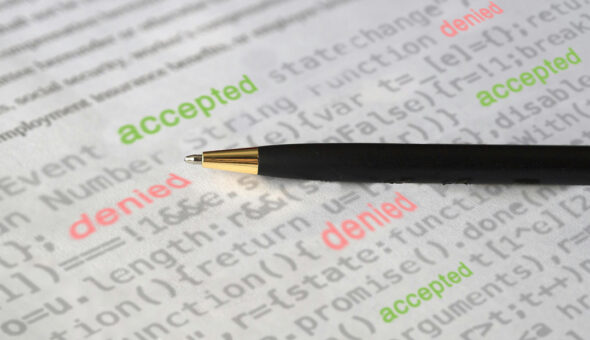A few months ago, hardly anyone had heard of ChatGPT. Now, the groundbreaking artificial intelligence chatbot has the full attention of higher-ed admissions counselors, consultants and educators across the globe.
Since November 2022, ChatGPT and a growing list of other “open AI” platforms have made cracking the code to a complex math equation or writing a detailed essay as simple as typing a question into a prompt box and letting a language model produce the entire answer in a matter of seconds. AI chatbots are significantly more advanced than even search engines such as Google because the programs produce direct answers to questions instead of merely providing a list of links to websites.
Those new features have made accessing information easier than ever for university students. But, is it a bad thing? Education pros still can’t say for sure. A few colleges in France, India and Hong Kong have opted for a full-scale ban until educators get a better feel for the popular technology and can put more guardrails in place. Most leaders in America’s higher education, though, believe in embracing the technology because open AI is “here to stay.”
“Educators must see the big picture and realize that with proper guardrails and responsible methods of teaching ethics, students can begin to utilize AI in such a way that will propel them through their careers and in their classrooms,” said Mark Cruver, an Atlanta area-based consultant and former university admissions officer. “It will provide opportunities for them to do things that they’ve never been able to before.”
Game-Changing Potential
Cruver has spent the past decade at the helm of his own consultancy firm, CapstoneEd, after serving as director of admissions at Bryan University in Dayton, Tennessee. He’s also teaching a class on the role of AI in education at the University of California, Berkeley.
During a career that’s spanned more than 20 years, Cruver said he’s never seen a technology with the potential to “change the game” to the degree that AI chatbots can. Then again, he said the same thing when the internet first became popular and when search engines started popping up.
“We could go all the way back to the calculator, which was disruptive and feared at the time but eventually got us to the moon,” said Cruver. “There have been many times in history when new technology has presented itself, and we’ve been fearful of moving forward with it because we’re scared of what we don’t know.”
Cruver expects higher ed will eventually accept and incorporate AI chatbots the same way it previously embraced most other major tech advancements. Otherwise, students will be in for a rude awakening when they graduate, he said.
“I can’t imagine a business degree without learning how to use AI,” said Cruver. “If I’m looking for a business program it better be using AI, because if it’s not, it’s an outdated program. It’s touching us in every corner of our existence and we’ve got to be prepared for it.”
“Academia is where ideas flourish,” he added, “and if educators are throwing a towel on these new ideas, then shame on them.”
Built-in Social Equity, Generic Admission Essays
In the eyes of many admissions consultants, including Nat Smitobol of IvyWise, AI chatbots represent a long-awaited opportunity for equity for students who have previously been left behind. That includes American students from low-income families, as well as students who come from around the world to study in the United States.
Smitobol, who worked as a director in the admissions offices of Skidmore College, New York University and the ultra-selective NYU Abu Dhabi before becoming a consultant, said properly used AI chatbots can level the playing field between students whose families can afford tutoring and students who are left to “figure everything out on their own.”
“There’s such a big gap in access to tutoring, and ChatGPT could absolutely be used that way,” he said. “It’s a free resource to ask for explanations and enhance understanding of certain concepts, but also to double-check answers and help students practice.”
The technology offers new avenues to tutoring and getting work done faster, but it’s by no means a divine answer for students to do all of their work—not yet, at least.
Smitobol noted that U.S. admissions offices often grade applicants on rubrics incorporating eight different categories to decide whether a prospective student would be a good fit at a university. Each category offers a maximum score of three points, meaning a student with a total score of 24 is deemed a perfect fit.
One of the categories is the admissions essay, which an AI chatbot can technically write but with “generic answers” that are “not very personalized,” according to Smitobol.
“Those generic answers score very low on what we call demonstrated fit,” he explained. “Admissions officers, especially at smaller liberal arts colleges, have to get a feel for who the student is and what kind of person they’re going to be on campus. A response from an AI chatbot doesn’t yet offer those very personalized and detailed responses.”
Cruver, the Atlanta area-based consultant, compared a college admissions essay written by ChatGPT to what Disney World might look like without the mind of Walt Disney.
“It’d be kind of like a playground at your local park,” he said. “Without Walt Disney’s infusion of imagination, creativity and breadth of understanding the big picture and his passions, all you have are swing sets and monkey bars. But once Walt Disney infused his personality into his vision, we got Cinderella’s castle, we got a theme park, we got legacy after legacy of programming that generations reflect on.
“That’s what the student brings to the table when utilizing the technology of artificial intelligence: their imagination. ChatGPT and any other open AI is nothing but swing sets and monkey bars. And you can’t really produce Cinderella’s castle-type writing until you infuse your personality and your imagination and your creativity into it.”
Still, both consultants admitted that thousands of new students in the upcoming academic year will certainly have used open AI platforms to write their admissions essays. Many will have slipped through the cracks thanks to high GPAs and test scores, especially at universities where essay answers aren’t a top priority.
Cheating and Using AI Responsibly
Marty Bennett serves as director of global recruitment and partnerships at the University of Nevada Las Vegas and heads his Ohio-based firm, SMIE Consulting. Bennett first learned about ChatGPT in December when one of his colleagues recommended trying it out to write a job description for an open position at the school.
“The text it gave us was spot-on,” Bennett recalled, “And we were like ‘oh my goodness, this is a little spooky.’”
Bennett, who specializes in welcoming overseas students, has seen first-hand the extreme lengths that young people unfamiliar with the American education system will go to for a chance to study in the United States. The most popular unscrupulous measures include cheating on English proficiency exams, outsourcing admissions essays to third-party “essay mills” and hiring con artists to fudge academic records.
Bennett said he’s identified two broad types of consistent cheaters during his 30 years in international recruitment and consulting for higher ed: students who will do anything necessary to achieve their dream of getting into an American university and students who are just plain lazy. For both groups, academic integrity and avoiding plagiarism can be just as foreign of concepts as the local language, food and American culture.
“These students get found out pretty quick,” he said. “If they don’t use these other tools to help them keep going, their classmates and teachers will know almost right away.”
Thankfully, most schools have resources in place to help international students become acclimated and teach them how to reference sources properly, Bennett said. Many programs also help students with reading, writing and speaking English if they need it.
“ChatGPT and a lot of these other platforms are useful in that they can provide citations, too, when prompted,” said Bennett.
Bennett, like Cruver and Smitobol, is against banning AI chatbots. However, he is for drawing a line somewhere in the sand. The bottom line, according to Bennett: students who want to cheat have always been able to find ways to cheat, and AI chatbots will only make that easier.
Universities that aim to completely stop cheating are being “unrealistic,” he said. Instead, Bennett advocates for teaching proper AI ethics so students understand how to use the new technology productively.
“I think we can get too full of ourselves in academia often,” he said. “This is a chance for institutions that are on the cutting edge technologically to see it as more of an opportunity than a challenge.”
“I’m not saying we need to embrace these platforms, but we definitely need to learn about them,” Smitobol added. “And saying no and not using it is not going to stop the technology from coming up and evolving. It’s in our best interest to try and figure them out and engage with them. We need to teach students how to do AI the right way.”







